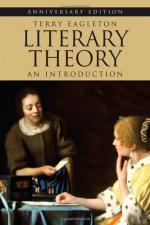
|
| Name: _________________________ | Period: ___________________ |
This quiz consists of 5 multiple choice and 5 short answer questions through Chapter 3, Structuralism and Semiotics.
Multiple Choice Questions
1. Both F.R. Leavis and Edmund Husserl seek to grasp the thing in itself, or the ______for Husserl and ______for Leavis.
(a) Idea; life.
(b) Image; eidos.
(c) Idea; essence.
(d) Eidos; life.
2. Literary texts are code-productive, code-transgressive, and code_____.
(a) Affirming.
(b) Orienting.
(c) Saturating.
(d) Confirming.
3. According to Eagleton, who "harnessed this Romantic humanism to the cause of the working class" in the late nineteenth-century?
(a) William Morris.
(b) Lord Byron.
(c) Percy Shelley.
(d) Samuel Coleridge.
4. According to Eagleton, the Russian formalist shifted their attention to the "material reality" of what?
(a) The fiction.
(b) The critic.
(c) The facts.
(d) The text.
5. According to the Russian critic Roman Jakobson, literature represents "organized ______committed on ordinary _______."
(a) Violence; speech.
(b) Protest; speech.
(c) Religion; writing.
(d) Violence; people.
Short Answer Questions
1. According to Viktor Shklovsky, what novel was "the most typical novel in world literature" because it impeded its own story-line so that it never gets off the ground?
2. What is the name of the critic from the Constance school of reception aesthetics and the author of "The Act of Reading" who Eagleton discusses at length?
3. What three sequential stages does Eagleton point out in the development of modern literary theory?
4. For Eagleton, Gadamer's theory only holds if one makes what "enormous assumption"?
5. According to Eagleton, when did the Russian formalists emerge?
|
This section contains 325 words (approx. 2 pages at 300 words per page) |

|




